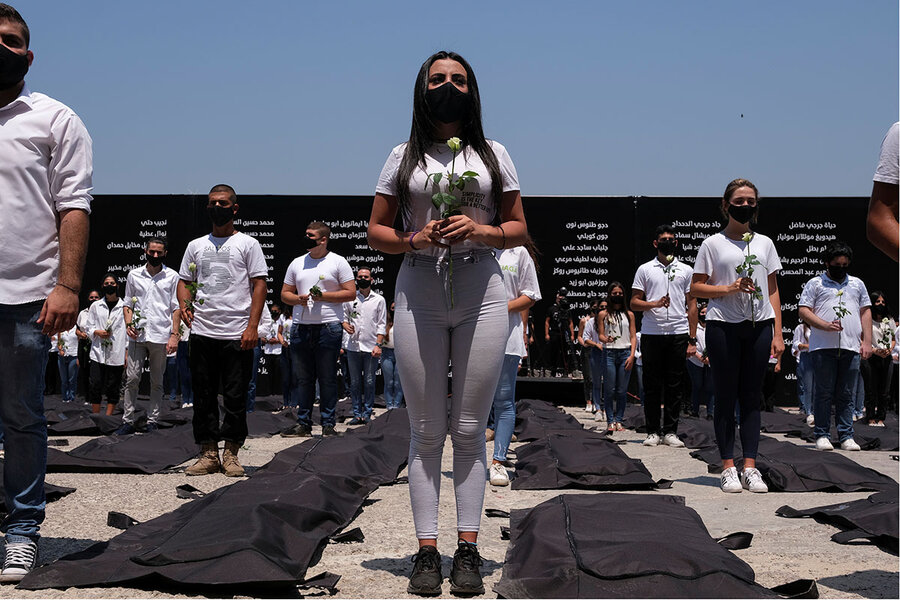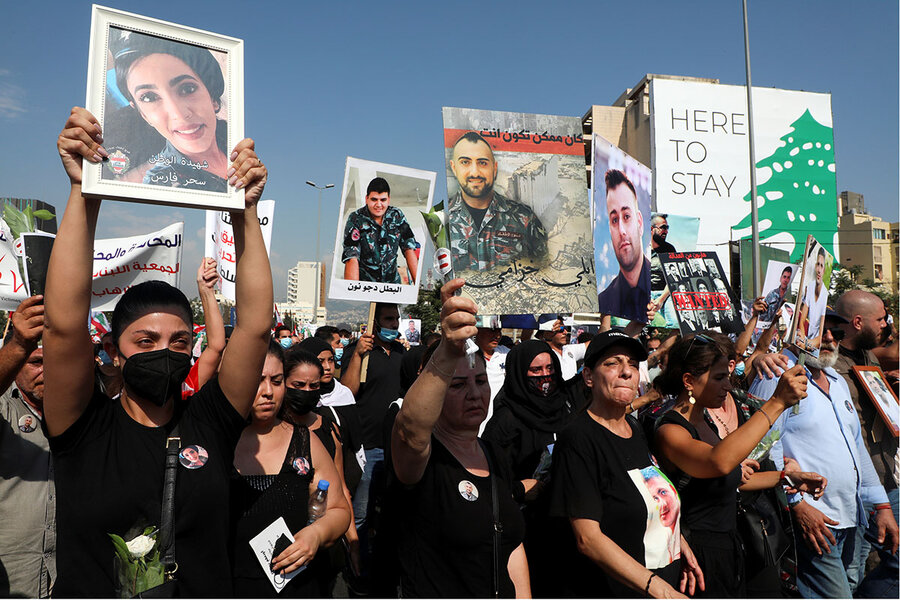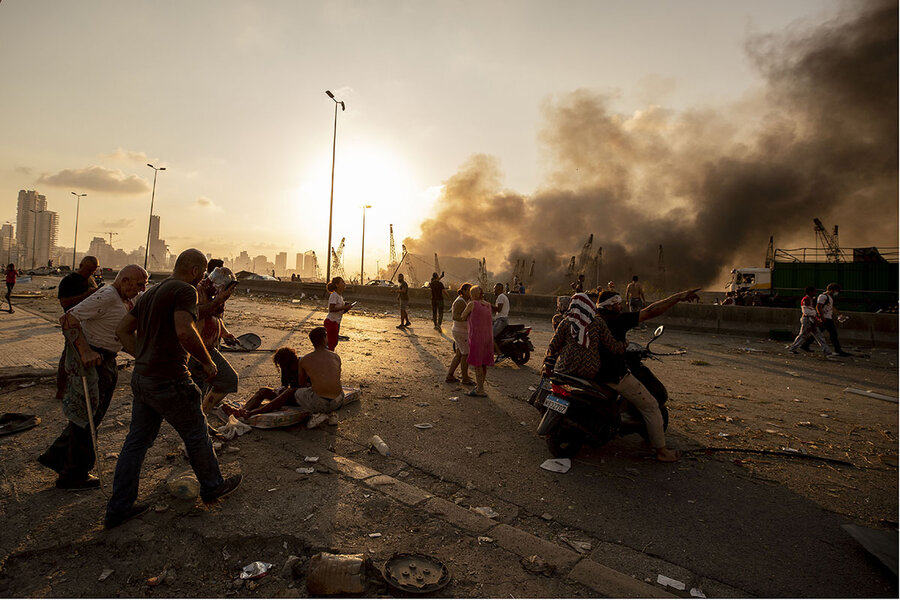Year after Beirut blast, Lebanese civilians create a future
Loading...
| London
Right after the devastating blast in the port of Beirut, Lebanon’s civil society swung into action, its skills well practiced after a series of national crises created or made worse by chronic political dysfunction. The result, one year later, is the emergence of a vigorous and competent movement that has seized the reins of rebuilding and convinced donors to bypass corrupt government institutions.
“Civil society managed to organize themselves into a pseudo-government. ... It was extraordinary,” says Paul Naggear, whose daughter was killed in the explosion. “They say, ‘My role is not to replace the government; it’s too much responsibility.’ But when they saw ... there was no [government] response, they had to step in.”
Why We Wrote This
A story focused onThe Beirut port blast exemplified the government ineptitude that had fueled Lebanon’s protest movement. In response, a resilient and energized civil society has taken charge of the rebuilding effort.
Today, their demands for accountability and reform are being heard at the highest level, and activists carrying out the recovery are sitting across the table from government officials.
“For the Western audience, Lebanon is this intricate web of mystery and eclecticism, and it’s not: It’s bad governance,” says Carmen Geha, an associate professor at the American University of Beirut.
“But there is a lot of talent and a lot of expertise and a lot of perseverance to want to do something differently,” she says. “There is a mobilizing happening.”
No Lebanese citizen who felt the shock wave of one of the largest non-nuclear blasts in history will ever forget its destructive power – or that it signaled a new low of negligence and corruption for Lebanon’s political elite.
The explosion a year ago of 2,750 tons of ammonium nitrate, poorly stored in Beirut’s port, destroyed swaths of the capital and enveloped the city in a shroud of trauma that left more than 200 dead and 300,000 homeless.
Lebanon marked the grim anniversary Wednesday with a day of mourning, and protests in Beirut demanding justice.
Why We Wrote This
A story focused onThe Beirut port blast exemplified the government ineptitude that had fueled Lebanon’s protest movement. In response, a resilient and energized civil society has taken charge of the rebuilding effort.
Yet even as Lebanon began last year to grope through one of its darkest moments, volunteers came from every corner of the country to help.
As if by reflex, Lebanon’s civil society swung into action, its skills well practiced after a 15-year civil war, multiple armed conflicts, a collapsed economy, the absorption of 1.5 million Syrian refugees, and the pandemic – all crises created or made worse by chronic political dysfunction.
The outpouring of public support was as unprecedented as the scale of ruin.
The website of the charity Offre Joie (Joy of Giving), for example, which for years had helped Lebanese rebuild from war and violence when government was absent, crashed as more than 6,000 volunteers rushed to sign up.
The result, one year later, is the emergence of a vigorous and competent civil society movement that has seized the reins of rebuilding and convinced donors to bypass corrupt government institutions.
And a unique mechanism called the Reform, Recovery and Reconstruction Framework (3RF) – run jointly under the United Nations, European Union, and World Bank – has made its demands for accountability and reform heard at the highest level and has placed activists carrying out the recovery across the table from government officials.
The demonstration of resilience has brought an expectation for change that could only have been dreamed of before the blast.
“This is the day for any citizen that wants to be part of the new Lebanon,” says Paul Naggear, an activist whose 3-year-old daughter, Alexandra, was killed in the explosion by what he calls a “criminal regime.”
“There is a before and after the 4th, and after the 4th is a movement of solidarity, with one cause, to get our country back,” says Mr. Naggear. “For us it was justice; for others it was rebuilding.”
Filling a vacuum
He and his wife, Tracy, were instrumental after the blast in uniting nongovernmental organizations as they advocated for victims’ families.
“Civil society managed to organize themselves into a pseudo-government. ... It was extraordinary,” says Mr. Naggear. “They say, ‘My role is not to replace the government; it’s too much responsibility.’ But when they saw after an hour, two hours, 24 hours, 48 hours, there was no [government] response, they had to step in.”
Lebanon had already been reeling from more than a year of street protests, the self-declared October revolution that began in late 2019 to end corruption and topple the ruling classes and their sectarian networks, which have been entrenched for decades.
The catastrophic blast was final proof, for many, of shameful malfeasance.
In a report released Tuesday, Human Rights Watch found that “multiple Lebanese authorities were, at a minimum, criminally negligent” in mishandling the dangerous chemicals for six years, and “tacitly accepted the risk of the deaths occurring.”
Today half the population has slipped below the poverty line amid a financial crisis and hyperinflation. Frequent blackouts punctuate chronic shortages of food and fuel, which have led to fights in supermarkets and long lines at gas stations.
The research center Lebanon Support found that civil society accounted for 62% of post-blast relief, and individual efforts for another 20%. The government contributed just 0.9% in the aftermath – a measure of invisibility that was all too obvious.
Bypassing failed government
But outrage has changed little at the top. The government resigned after the explosion, and quarreling politicians have yet to agree on a new one. The EU has prepared sanctions targeting Lebanese officials.
“Lebanese leaders seem to bet on a stalling strategy, which I regret and I think is a historic and moral failure,” French President Emmanuel Macron said Wednesday as he opened a donor conference that aimed to raise $350 million.
“There will be no blank check for the Lebanese political system. Because it is they who, since the start of the crisis but also before that, are failing,” Mr. Macron said.
France already bypassed the Lebanese government to provide $100 million in direct assistance to the Lebanese people in 2020 – often utilizing civil society initiatives that have proved transparent and effective.
That is just one data point in a trajectory of bottom-up change, activists say.
“For the Western audience, Lebanon is this intricate web of mystery and eclecticism, and it’s not: It’s bad governance that literally exploded,” says Carmen Geha, an associate professor at the American University of Beirut and an activist who co-founded Khaddit Beirut (Beirut’s Shake-Up).
“But there is a lot of talent and a lot of expertise and a lot of perseverance to want to do something differently,” says Ms. Geha. “There is a mobilizing happening.”
She lists a confluence of changes in the past year that add up to a “historic transformation” wrought by citizen initiatives, from rebuilding homes, shops, and restaurants, and making blood donations a national cause, to professional advocacy and human rights groups.
2022 elections
New, independent political parties also have emerged. Ms. Geha’s own Khaddit Beirut includes business owners, academics, and experts pushing for reform. A key test will be parliamentary elections in 2022.
“My agenda for the election next year is not to run or support people, but to put what these NGOs are doing on any [candidate’s] agenda,” says Ms. Geha. “We don’t want an NGO country, but for now we need to champion that model.”
Despite civil society gains and even optimism, the fact that the ruling classes remain entrenched makes this anniversary bittersweet, says Ms. Geha.
“This is the darkest moment because they are still on TV. ... I can see their faces. I feel like I’m living with” an abuser, she says. “There is a lot of hope in the dark – but it is very dark.”
Starting to change that equation is the 3RF network, which aims to insert technical assistance and harness know-how from 100-plus civil society groups.
“This is the missing link between the street, and what’s happening in the government,” says Jaap van Diggele, coordinating officer at 3RF in Beirut and a former Dutch diplomat.
“It’s the PM of Lebanon and CSOs [civil society organizations] facing each other as equal co-chairs, saying, ‘You need to focus on this. You need to focus on that,’” he says.
“These people have never been in the same room together, so it’s a lot of work to channel that energy into something where we all sit around the table and say, ‘We agree. How do we make this work?’” says Mr. Van Diggele.
Tapping civil society expertise
“The level of professionalism, the deep substantive knowledge about what needs to be done in this country – it’s very impressive, across the board, whether the water or electricity sectors, or governance, or freedom of the press,” says Mr. Van Diggele.
That expertise has often been honed by decades of vital civil society action. At the forefront has been Offre Joie, which harnessed thousands of volunteers to rebuild some 60 buildings in two wrecked neighborhoods closest to Beirut’s port.
“The goal is not [only] to build homes; it’s to unite Lebanese citizens,” says Christopher Rizk, a civil engineer and senior volunteer who has worked with Offre Joie since 2012.
“Peace can be reached by letting volunteers from all over the country work together, which is when they will notice that this is not about religion, or about political affiliation, but ... wanting to build a better country,” says Mr. Rizk.
Those 350 families with rebuilt homes “are extremely grateful ... but they are still deeply traumatized by the explosion, and these wounds take longer to heal,” says Mr. Rizk. Watching volunteers work tirelessly for a year “inspires you and keeps you pushing, and pushing, and pushing for something better.”
That includes stepping in where officials fail to tread, such as rebuilding the fire brigade headquarters. Ten of its firemen died in the explosion.
“We thought initially that the government would do it,” says Mr. Rizk.
“Everyone was talking about the different martyrs of the fire brigade, so we thought the government would care about this,” he says. “But after a few months we noticed they were still sleeping in tents. We couldn’t believe it, so we decided to take it as well.”










